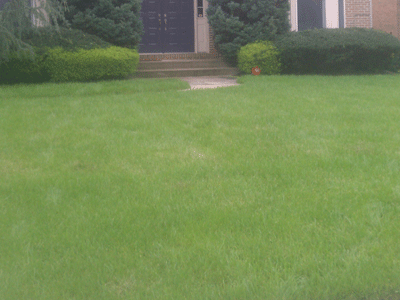As we prepare for our upcoming warmer weather we start to prepare for the upkeep of our landscaping and lawns. Here is an in depth look at what you or your contractor should be doing to have a luxurious lawn in the summer months. There should be a systematic approach for the things that need to or should be done.
Since we live an area of cool season turf grass, it is not recommended to aerate the lawn in the spring; fall is actually the best time. Over time the soil becomes compacted and water, air, and other nutrients are not absorbed into the soil. The nutrients are not only the fertilizer we apply but natural micro nutrients that are absorbed. The aeration plugs holes into the soil to allow the water, air and nutrients to be absorbed into the soil, and helps break up the compaction of the soil. Aeration should be done every one to three years depending on the type of soil you have and foot traffic on the lawn, i.e. lawn mowers, kids playing in the yard and your pets.
Another thing which is recommended for the fall is removing the thatch (decaying plant material), especially if it is a half inch or more. Raking in the spring will not hurt either especially if you have compacted soil. The thatch will block the sunlight from the grass and prevent water from reaching deep roots.
Proper fertilization is very important to a healthy lawn. There are many fertilizers with different seasonal steps available, however, proper fertilization is important here, as you should follow the labels specification instructions for spreader settings, application rates based on the type of spreader you are using, drop or rotary spreader. Remember to decrease your rates in the heat of the summer. You also want to apply a lesser rate for heavily shaded areas of your property. Keep in mind the state of New Jersey has specific guidelines for when you may apply fertilizers, and contractors for hire must be certified as per the new law implemented in 2011.
Water, is the most vital thing for a green lawn. A properly designed underground sprinkler system is more beneficial as it waters on specific days of the week, and saves you the trouble of dragging a hose and wasting water. Over watering can be detrimental to your lawn so please know what works for your property. A good qualified licensed irrigation contractor should be able to walk you through the property and discuss proper watering for your property. Again, please make sure if you use a sprinkler contractor they are licensed to do irrigation in the state of New Jersey, it is the law.
Now for the last approach, lawn mowing. In the spring you may need to mow sooner than every seven days depending on the type of weather we are having and the fertilizer you applied. Cutting height should never be below two and half inches. Every week the pattern of cut should be changed to help the grass plant grow straight. In the extreme heat of the summer the blades should be raised to a height of three inches. It is not recommended to mow in the rain or after a heavy rainfall.
Always be aware of unsettling changes in your lawn, brown spots or areas that may appear not in conformity with the rest of the lawn.
May your green thumb carry you through the season.


The segment of your article that discussed the proper fertilization methods needed to keep a summer lawn healthy was really helpful. I love how our current lawn looks and feels, and I’m aware that the summer heat can really ruin that if I’m not careful enough. To make sure this doesn’t happen, I’ll look for a lawn fertilization expert that can assist us in fertilizing it the right way.
Hi Afton,
Thank you for your feedback. We are licensed in fertilization too so for next year you might consider us.
Best regards,
John